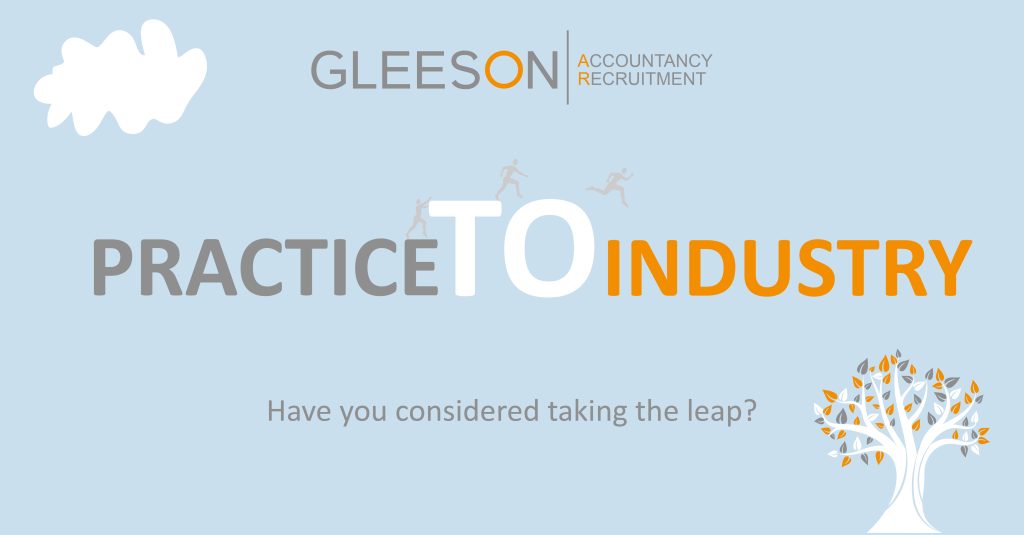Accounting: Practice Vs Industry
RECRUITMENT • Aug 20, 2019

Have you considered taking the leap from Practice to Industry? Unsure where to start? Well, we’re here to help. Here at Gleeson, we have a wealth of experience in placing people from Practice to Industry, from first-time movers to FTSE 100 chief execs. So, if you’re considering taking the leap and you’d like some honest advice, get in touch. In the meantime, here are some frequently asked questions…
What’s the difference?
Practice:
Offering professional services to both private and public sector companies, practice gives accountants fantastic exposure to multiple clients, from many different industries. Working in this environment teaches the versatility, adaptability and time management needed to meet multiple client’s needs simultaneously. Practice can range in size from large multinational firms like Deloitte, EY, KPMG and PwC (often referred to as the ‘Big 4’) right down to the much smaller local firms.
‘Working for the Big 4 gave me a lot of opportunities to work with different people and for different clients; I did work in the public sector, listed companies and in other smaller private companies… it gave me a lot of exposure to different strategic risks and opportunities to apply different accounting standards too,’ Harriet Lawson (Group Assistant Assurance Manager, Homeserve).
Industry:
Industry offers accountants freedom to choose who it is that they work for – from their sector to their size and location – you will work directly for that one business and have more opportunities to make a tangible impact than you would in practice.
‘[Moving to Industry,] I’m not just learning about how to do an audit in an external audit environment, I’m learning more about what drives the business to meet strategic objectives… the difference is that I feel part of the company,’ Harriet Lawson (Group Assistant Assurance Manager, Homeserve).
How do I know which one is right for me?
In recent years, it’s becoming a lot more common for people to take the leap from Practice to Industry, but it’s not for everyone. Much like any other job hunt, key deciding factors to take into consideration include (but are not limited to):
- Company culture
- Potential for progression
- Industry sector
- Job level
- Remuneration
Both Practice and Industry have their own list of pros and cons and knowing which one is right for you will depend entirely on your priorities. What kind of environment do you work best in? Do you thrive in the hubbub of a bustling office or do you prefer to get things done in your own space? Do you prefer variety or repetition? Which industry would you like to work in? Answering these questions will give you a reasonable starting point.
What are the easiest roles to transition to from Practice if I have a background in…
… Audit? Internal Audit / Financial Reporting
… Corporate Finance? Inhouse M&A / Corporate Finance / Commercial Finance
… Transaction Services? FP&A / Commercial Finance
… Restructuring? Commercial Finance / Business Partnering
… Tax? Tax Accountant / Financial Accountant
Your previous experience will determine which role in Industry would be the most suitable for you to transition into. Above are just a few of the most common examples. If you are uncertain, we recommend talking to someone who has made the transition already or to have a casual chat with your friendly neighbourhood recruitment consultants– based in both Birmingham and Reading, our Consultants have an average of 12 years’ accountancy recruitment experience, so they know a thing or two about taking the leap.
What are the clear lines of progression?
Practice is known for having a clearly paved career progression route. Typically, you will start out as a junior associate whilst studying, progressing to an associate role once qualified. Once you have a few years of experience under your belt, you will move onto more senior finance or managerial roles with the opportunity to pursue a Director / Partner level appointment.
Career paths in Industry aren’t always so clear cut, but there’s nothing stopping you from carving out your own. On a similar pattern to Practice, in Industry you will start out as an accounts clerk/assistant/admin role whilst studying. Post qual, you will progress to a financial analyst/financial accountant/management accountant. After a few years, you will likely progress to a finance manager/controller, leading to a senior level role (such as Finance Director or CFO).
In both Practice and Industry, the timescale that your career spans across will depend almost entirely on the size of the business/firm you are working for. Larger firms will have a sequential progression route that will allow you to advance to senior and managerial roles internally. Working for an SME will give you exposure to a wider variety of transferable ‘hands-on’ experience that you can bring with you to your next move. If you are considering moving to Industry, your first move is an important milestone that will have a huge impact on your progression route.
When is the right time to move?
‘The market now has changed so there are a lot more options open to newly qualified people considering making a move into Industry. My advice is that, unless something drastic happens, you should always see out your study contract. There’s no point moving until you’ve got that qualification under your belt. At that point, people generally decide whether they want to make a move, or they’ll stay on in the profession,’John Taylor (Divisional Managing Director, Accountancy and Finance).
What’s the work/life balance like?
In addition to expanding your network, Practice offers a fantastic opportunity to strengthen your business development, negotiation, and technical skills. But, because Practice is customer facing, it is all consuming – managing and delivering to the expectations of multiple clients simultaneously can be demanding. Some people thrive in a fast-paced environment, but it’s not for everyone. Industry allows you to focus on the financial journey of one company and their successes as opposed to spreading your services across multiple clients – so it is known for less travel, its shorter, more consistent, hours and therefore a better work/life balance.
Can I change my mind?
What happens if you take the plunge and it doesn’t turn out to be what you anticipated? Choosing one route over the other doesn’t have to be final. There are countless fearmongering articles out there to say making the transition from Industry to Practice is next to impossible. We say that that depends entirely on your experience. Though changing from Industry to Practice is uncommon, it’s not impossible. If you gained a respectable/reputable amount of experience in Practice before taking the leap, returning to Practice is easy (and if anyone tells you any different, you send them to us!).
Final thoughts?
We’re not here to tell you what to do or to force you one way or another. But if you are considering taking the leap from Practice to Industry and you are unsure of when to start – feel free to get in touch and speak to one of our experienced Consultants. We have supported and placed hundreds of ambitious candidates from Practice to Industry, so we can help you figure out what is right for you.




